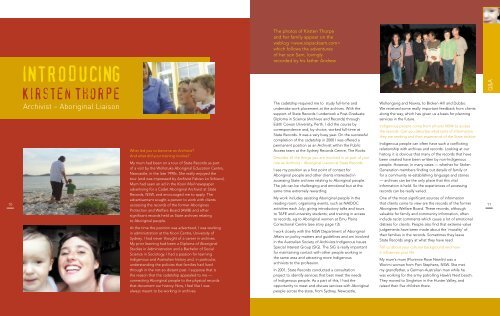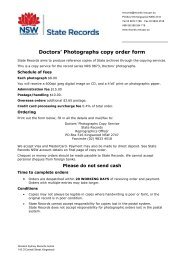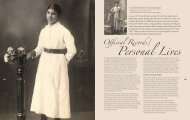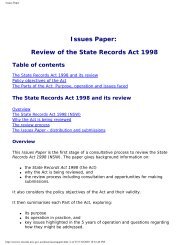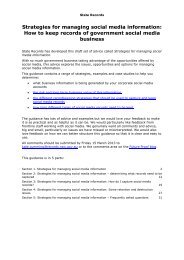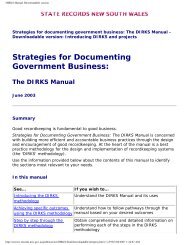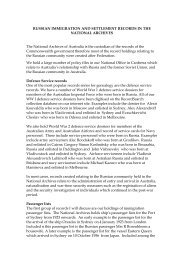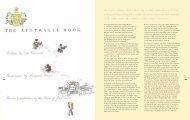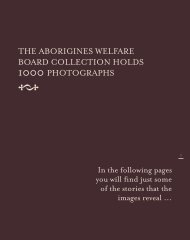Kirsten Thorpe - State Records NSW
Kirsten Thorpe - State Records NSW
Kirsten Thorpe - State Records NSW
You also want an ePaper? Increase the reach of your titles
YUMPU automatically turns print PDFs into web optimized ePapers that Google loves.
The photos of <strong>Kirsten</strong> <strong>Thorpe</strong><br />
and her family appear on the<br />
weblog <br />
which follows the adventures<br />
of her son Sam, lovingly<br />
recorded by his father Andrew<br />
10<br />
INTRODUCING<br />
<strong>Kirsten</strong> <strong>Thorpe</strong><br />
Archivist – Aboriginal Liaison<br />
What led you to become an Archivist<br />
And what did your training involve<br />
My mum had been on a tour of <strong>State</strong> <strong>Records</strong> as part<br />
of a visit by the Wollotuka Aboriginal Education Centre,<br />
Newcastle, in the late 1990s. She really enjoyed the<br />
tour (and was impressed by Archivist Fabian Lo Schiavo).<br />
Mum had seen an ad in the Koori Mail newspaper<br />
advertising for a Cadet Aboriginal Archivist at <strong>State</strong><br />
<strong>Records</strong>, <strong>NSW</strong>, and encouraged me to apply. The<br />
advertisement sought a person to work with clients<br />
accessing the records of the former Aborigines<br />
Protection and Welfare Board (AWB) and other<br />
significant records held as <strong>State</strong> archives relating<br />
to Aboriginal people.<br />
At the time the position was advertised, I was working<br />
in administration at the Koori Centre, University of<br />
Sydney. I had never thought of a career in archives.<br />
My prior learning had been a Diploma of Aboriginal<br />
Studies in Administration and a Bachelor of Social<br />
Science in Sociology. I had a passion for learning<br />
Indigenous and Australian history and, in particular,<br />
understanding the policies that families had lived<br />
through in the not-so-distant past. I suppose that is<br />
the reason that the cadetship appealed to me —<br />
connecting Aboriginal people to the physical records<br />
that document our history. Now, I feel like I was<br />
always meant to be working in archives.<br />
The cadetship required me to study full-time and<br />
undertake work placement at the archives. With the<br />
support of <strong>State</strong> <strong>Records</strong> I undertook a Post-Graduate<br />
Diploma in Science (Archives and <strong>Records</strong>) through<br />
Edith Cowan University, Perth. I did the course by<br />
correspondence and, by choice, worked full-time at<br />
<strong>State</strong> <strong>Records</strong>. It was a very busy year. On the successful<br />
completion of the cadetship in 2000 I was offered a<br />
permanent position as an Archivist within the Public<br />
Access team at the Sydney <strong>Records</strong> Centre, The Rocks.<br />
Describe all the things you are involved in as part of your<br />
role as Archivist – Aboriginal Liaison at <strong>State</strong> <strong>Records</strong><br />
I see my position as a first point of contact for<br />
Aboriginal people and other clients interested in<br />
accessing <strong>State</strong> archives relating to Aboriginal people.<br />
The job can be challenging and emotional but at the<br />
same time extremely rewarding.<br />
My work includes assisting Aboriginal people in the<br />
reading room; organising events, such as NAIDOC<br />
activities each July; giving introductory talks and tours<br />
to TAFE and university students; and training in access<br />
to records, eg to Aboriginal women at Emu Plains<br />
Correctional Centre (see story page 13).<br />
I work closely with the <strong>NSW</strong> Department of Aboriginal<br />
Affairs on policy matters and guidelines and am involved<br />
in the Australian Society of Archivists Indigenous Issues<br />
Special Interest Group (SIG). The SIG is really important<br />
for maintaining contact with other people working in<br />
the same area and attracting more Indigenous<br />
archivists to the profession.<br />
In 2001, <strong>State</strong> <strong>Records</strong> conducted a consultation<br />
project to identify services that best meet the needs<br />
of Indigenous people. As a part of this, I had the<br />
opportunity to meet and discuss services with Aboriginal<br />
people across the state, from Sydney, Newcastle,<br />
Wollongong and Nowra, to Broken Hill and Dubbo.<br />
We received some really important feedback from clients<br />
along the way, which has given us a basis for planning<br />
services in the future.<br />
Indigenous people come from all over <strong>NSW</strong> to access<br />
the records. Can you describe what sorts of information<br />
they are seeking and their experience of the <strong>State</strong> archive<br />
Indigenous people can often have such a conflicting<br />
relationship with archives and records. Looking at our<br />
history, it is obvious that many of the records that have<br />
been created have been written by non-Indigenous<br />
people. However, in many cases — whether for Stolen<br />
Generation members finding out details of family or<br />
for a community re-establishing language and stories<br />
— archives can be the only place that this vital<br />
information is held. So the experiences of accessing<br />
records can be really varied.<br />
One of the most significant sources of information<br />
that clients come to view are the records of the former<br />
Aborigines Welfare Board. These records, although<br />
valuable for family and community information, often<br />
include racist comments which cause a lot of emotional<br />
distress for clients. People also find that extreme value<br />
judgements have been made about the ‘morality’ of<br />
their families in the records. Sometimes they leave<br />
<strong>State</strong> <strong>Records</strong> angry at what they have read.<br />
Tell us about your cultural background and how<br />
it influences your life<br />
My mum’s mum (Florence Rose Newlin) was a<br />
Worimi woman from Port Stephens, <strong>NSW</strong>. She met<br />
my grandfather, a German-Australian man while he<br />
was working for the army patrolling Hawk’s Nest beach.<br />
They moved to Singleton in the Hunter Valley, and<br />
raised their five children there.<br />
Q&A<br />
11
12<br />
My mum’s family (on her mum’s side) goes back<br />
to Florence Manton and Violet May Newlin. Mum’s<br />
family had connections to Karuah Mission, Soldiers<br />
Point, went to school in Pindimar and eventually<br />
settled in Tea Gardens. My mum’s grandfather was<br />
an American man from New Jersey.<br />
Dad’s grandfather was born on the ‘high seas’ and<br />
orphaned after his parents died in Sydney. He and<br />
his brothers were sent to the Benevolent Society<br />
and Dad’s grandfather eventually ended up settling<br />
in Jamberoo, <strong>NSW</strong>. We recently discovered that his<br />
grandfather’s mother was a Chinese and local<br />
woman from New Caledonia.<br />
We have such an interesting combination of cultures<br />
in our background, but it is probably the experiences<br />
of Mum’s family, particularly her mother, that have had<br />
the greatest affects on our lives today. You realise the<br />
impact of our history on people’s well-being and future.<br />
My mum’s Uncle Norman has always been active in<br />
Aboriginal services in Sydney. My two sisters, Katrina<br />
and Khi-lee, are also working in Sydney. Katrina is a<br />
lecturer at the University of Sydney and Khi-lee is<br />
working for Boomalli Artists Co-op.<br />
What kind of response do you have in the presence<br />
of the actual physical records<br />
When I first started working at <strong>State</strong> <strong>Records</strong>, I had<br />
a really hard time being in the same physical space as<br />
the Welfare Board records; even the sight of an AWB<br />
box made me uneasy. I suppose since then, I have<br />
tried to look at the positive side of why the records<br />
have survived.<br />
I love working in archives and being exposed to the<br />
collection at <strong>State</strong> <strong>Records</strong>. I get great inspiration from<br />
seeing letters drafted or written by Aboriginal people in<br />
colonial times asking for rights and better living conditions.<br />
What do you still hope to achieve or set in motion<br />
in your position<br />
Overall, just making it easier for Aboriginal people<br />
to access cultural and personal information. Letting<br />
people and communities know the valuable information<br />
that can sometimes be stored here. At the same time,<br />
creating the balance of protecting people’s privacy and<br />
creating a place of respect for cultural material held<br />
within the various government agencies.<br />
There are a lot of years of catching up to be done,<br />
getting Indigenous people involved in archives and<br />
being a part of everyday services. I feel that we are<br />
really on the way to making this happen.<br />
What impact has having a child had on your sense<br />
of a cultural past, present and future<br />
Coming back to work from maternity leave, I had<br />
to adjust to being back in contact with the records.<br />
This time, though, it was much harder. It's hard to<br />
imagine the shock that parents and children must have<br />
gone through after being separated by the authorities.<br />
Balancing work and family life is important to me now.<br />
I also have a real sense of being an archivist (I hope<br />
I don’t go overboard), keeping important things of<br />
Sam’s life, whether it is his favourite shoes, newspaper<br />
clippings or drawings he has done. I save them for<br />
him to enjoy and probably have a real laugh at<br />
when he is older.


